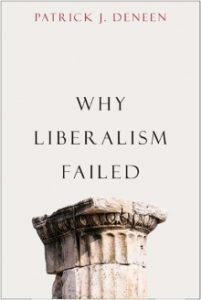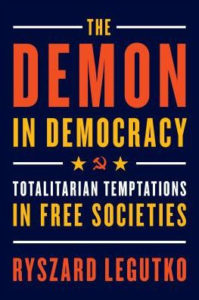 Nearly fifty years after the Soviet empire’s collapse, the few remaining states adhering to the Stalinist model hold little allure, notes Gabriel Schoenfeld, the author of, among other books, Necessary Secrets: National Security, the Media, and the Rule of Law. But the extraordinary vilification of liberal democracy persists. By some strange historical inversion, the vilification is no longer coming from the Left but the Right. A case in point is the widely discussed book, Why Liberalism Failed, by Patrick Deneen, a professor of political science at Notre Dame, he writes for The American Interest:
Nearly fifty years after the Soviet empire’s collapse, the few remaining states adhering to the Stalinist model hold little allure, notes Gabriel Schoenfeld, the author of, among other books, Necessary Secrets: National Security, the Media, and the Rule of Law. But the extraordinary vilification of liberal democracy persists. By some strange historical inversion, the vilification is no longer coming from the Left but the Right. A case in point is the widely discussed book, Why Liberalism Failed, by Patrick Deneen, a professor of political science at Notre Dame, he writes for The American Interest:
Deneen’s basic argument is that liberalism has failed because of a contradiction lying in its very heart. Thanks to the radical individualism that is its core idea, liberalism acts “as a solvent upon all social bonds,” inexorably causing the disintegration of the fundamental ties of civic and familial life that make a decent social order possible. “Liberalism has failed,” he writes, “because liberalism has succeeded. As it becomes fully itself, it generates endemic pathologies more rapidly and pervasively than it is able to produce Band-aids and veils to cover them.”
 Deneen professes to value liberty, but the liberty he values is distinct from what he calls our currently existing “ersatz version,” the primary negative achievement of which is combining “systematic powerlessness with the illusion of autonomy in the form of consumerist and sexual license,” Schoenfeld adds. If Deneen succeeds in his project of liberating us from liberalism root and branch, one trembles to contemplate what substitute will come in its place as the fruit of post-liberal “epic theorizing.”
Deneen professes to value liberty, but the liberty he values is distinct from what he calls our currently existing “ersatz version,” the primary negative achievement of which is combining “systematic powerlessness with the illusion of autonomy in the form of consumerist and sexual license,” Schoenfeld adds. If Deneen succeeds in his project of liberating us from liberalism root and branch, one trembles to contemplate what substitute will come in its place as the fruit of post-liberal “epic theorizing.”
Ryszard Legutko’s 2016 book, The Demon in Democracy: Totalitarian Temptations in Free Societies, is another instance of how conservative jeremiads that condemn liberal democracy as irredeemably flawed damage the cause of freedom at a moment of mounting vulnerability.







